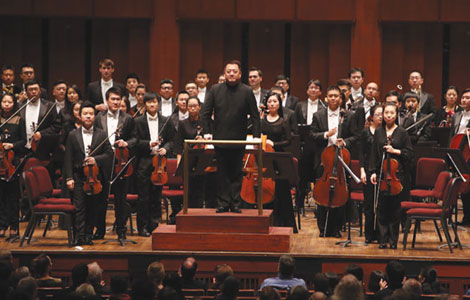Mandarin in six months? Can it work?
Updated: 2014-11-04 09:46
By PAUL WELITZKIN in New York(China Daily USA)
|
|||||||||
Mandarin is considered one of the more difficult foreign languages to learn for native English speakers. Can basic conversational fluency in China's predominant language be taught in six months?
Yangyang Cheng, founder and CEO of Yoyo Chinese, believes that English speakers can do it in that time period with her video instructional program that is sold by subscription. On Oct 30, the Arcadia, California-based company that was started in 2012 said students had taken over 7 million lessons to learn Mandarin.
Cheng said her classes aim to teach Mandarin as it is spoken in China today with a curriculum that focuses on native English speakers. Videos provide entertaining explanations of Chinese language concepts by using animation and special effects.
"We use the same accents and word choices that the Chinese people use on a daily basis. My goal is for students to understand authentic Chinese rather than rehearsing scripted dialogue that is rarely used," she said in an interview. "We don't attempt to teach writing and speaking at the same as other programs do. I believe that is too overwhelming for most students. I think it is best to focus first on learning to speak Mandarin and then master the writing later."
Yoyo's fees are one month for $45, three months for $75, six months for $99, and one year for $159. The program includes a downloadable study schedule with daily assignments that can be completed in about 45 minutes. Cheng said she believes most students can attain basic conversational fluency in as little as 6 months with a 45-minute daily class.
Wanling Zhang is the manager of the Adult Language Program at the China Institute in New York. She said it is possible for someone to obtain fluency in six months in but said it depends on how you define basic conversational Mandarin. "Are you just talking about saying hello and goodbye or are you referring to an actual conversation?" she said.
Zhang said the China Institute's beginner's program for Mandarin includes six levels. "We have teachers who utilize video and online instruction but the use depends on what level the student is at. Technology can be very useful but it really depends on what method is best for each individual student."
Stephanie A. H. Divo is director of the Intensive Mandarin Program and a senior lecturer in Chinese at Cornell University in Ithaca, New York. She told China Daily in an email that she doesn't know Yoyo's curriculum to comment on the feasibility of becoming fluent in basic conversational Mandarin in six months. "It all depends on how you define basic conversational Mandarin - our standards may be higher than theirs." Divo said there is a role for video learning and classroom-based instruction and notes that many traditionalChinese-language courses use both methods.
Cheng said she has been teaching Mandarin for 13 years. After obtaining an undergraduate degree from the Chinese University in Hong Kong, the Beijing native came to the US and began teaching Mandarin to business students at Pepperdine University in Malibu, California.
"When I was teaching at Pepperdine, I noticed how hard it was for English-speaking students to learn the language," she told China Daily in an interview on Monday. "I then looked for a way to deliver lively and engaging lessons."
Her background as a television host of Hello! Hollywood, and the Discovery Channel's Oh My Buddha, laid the foundation for the video tutorial approach that has become the hallmark of Yoyo's instructional program. Hello! Hollywoodwas a Chinese television program that was produced in the US.
According to Cheng, demand for Mandarin instruction has never been higher. There are an estimated 1.2 billion Mandarin speakers worldwide, with 2.9 million in the US.
paulwelitzkin@chinadailyusa.com

 John Kerry speaks about US-China relations
John Kerry speaks about US-China relations
 China orchestra plays in Washington
China orchestra plays in Washington
 Top 5 sectors that will ride on top of 'through train'
Top 5 sectors that will ride on top of 'through train'
 Forum Trends: Should students study abroad?
Forum Trends: Should students study abroad?
 Hong Kong films to take center stage
Hong Kong films to take center stage
 Healing through art at UN
Healing through art at UN
 Lucie photo awards presented in New York
Lucie photo awards presented in New York
 Tibetan culture to take center stage
Tibetan culture to take center stage
Most Viewed
Editor's Picks

|

|

|

|

|

|
Today's Top News
Alibaba Q2 revenue surges
Healing through art at UN
China orchestra plays in Washington
Asian American seeks RI governorship
Chinese envoy urges to enhance nuclear safety
US packer opens new plant in China
Mandarin in 6 months?Can it work?
New agency to strengthen graft fightus
US Weekly

|

|








